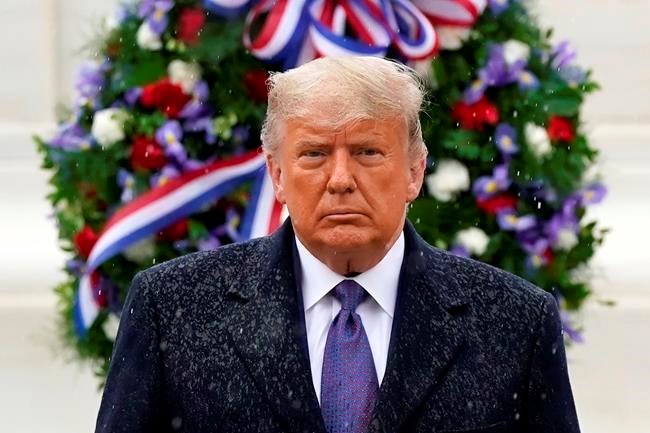WASHINGTON, D.C. — Americans are strapping in for another two months of Trump-fuelled turbulence, wishing their country had some bedrock principles for how disgruntled leaders ought to behave after losing an election.
Canada might have just the thing.
The "principle of restraint," also called the "caretaker convention," enforces the country's constitutional norm of responsible government and has been regulating the behaviour of outgoing incumbents for nearly 150 years.
It kicks in whenever an election is called, which dissolves Parliament and removes the principal mechanism by which elected federal lawmakers in Canada are held to account, and lingers until the new government is sworn in.
During that period, it requires the government in power to show restraint when it comes to new policies, spending measures and appointments, "since it cannot assume it will command the confidence of the House of Commons in the next Parliament."
The convention is not a law, but has been an important guiding principle for outgoing governments for so long it would likely stand up in court, said University of Ottawa constitutional scholar Errol Mendes.
It's an acknowledgment "that a government which has been defeated should not in any way be able to affect the ongoing attempts by the new government to carry out its new policies," Mendes said.
"It would be outrageous in any Canadian election period, and after the election, to see the sort of thing that's happening the United States."
The U.S. is on edge following President Donald Trump's decision to replace senior Defense Department leaders and his administration's refusal to acknowledge Joe Biden as president-elect.
"You are destabilizing the chain of command as you are also calling into question the most fundamental part of our democracy," said Brett Bruen, a consultant and former U.S. diplomat who worked as an adviser in Barack Obama's White House.
"It is a perfect storm in terms of what could go wrong."
On Monday, Trump unceremoniously fired Defense Secretary Mark Esper via tweet — a post-election development so long expected that Esper had reportedly already drafted a letter of resignation in case it was needed.
But the next day, the purge continued: three other civilian advisers, including Esper's chief of staff and the top Pentagon officials in charge of policy and intelligence and security, were gone, replaced by Trump loyalists.
One of the replacements, retired army brigadier-general and Fox News fixture Anthony Tata, once called Obama a "terrorist leader" and is known for promoting conspiracy theories. He was Trump's original pick for the policy job, but the Senate refused to confirm him.
Christopher Miller, formerly the head of the National Counterterrorism Center, has replaced Esper. His chief of staff is Kash Patel, a Trump backer best known as the author of a controversial 2018 memo that accused FBI and Justice Department officials of working to undermine the president.
Reports suggest the moves may be an effort by Trump to accelerate the withdrawal of U.S. troops from the Middle East, in particular Afghanistan — a long-standing promise that Esper and others stringently opposed.
Bruen said it's likely that once the dust settles, there will be calls for changes to better ensure future presidents can't salt the soil to such a degree on their way out of the White House.
"We will certainly see reform of the laws and the guidelines for how appointments and the operations of government function," he said.
"This is going to be similar to the post-Watergate era, where there has to be a hard look at what were norms and traditions, and what needs to be codified into law."
Canadian Sen. Murray Sinclair suggested Wednesday that Trump could be making plans to hold on to power and that Canada should brace itself for the possibility of escalating civil unrest south of the border.
"If military action is taken, or a civil war is started, by the person holding the office of president, the implications for Canada need to be considered," Sinclair, a former Manitoba judge, posted on Facebook.
As commander-in-chief, Trump has broad powers over the military, Mendes noted.
"He has the constitutional ability to order any type of military action, as long as they are lawful — in other words, as long as he's not demanding they commit war crimes or crimes against humanity," he said.
Any late-term military action, such as an attack on Iran, could then leave president-elect Joe Biden with a serious crisis on his hands.
"I think that's highly possible, and that's something which I think the U.S. should be considering as to whether or not this is tantamount to a form of coup attempt," said Mendes.
This report by The Canadian Press was first published Nov. 11, 2020.
James McCarten, The Canadian Press

